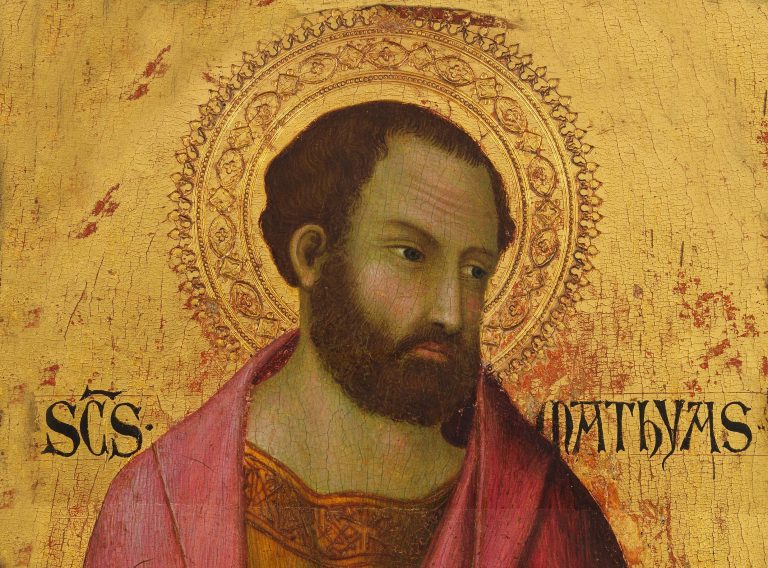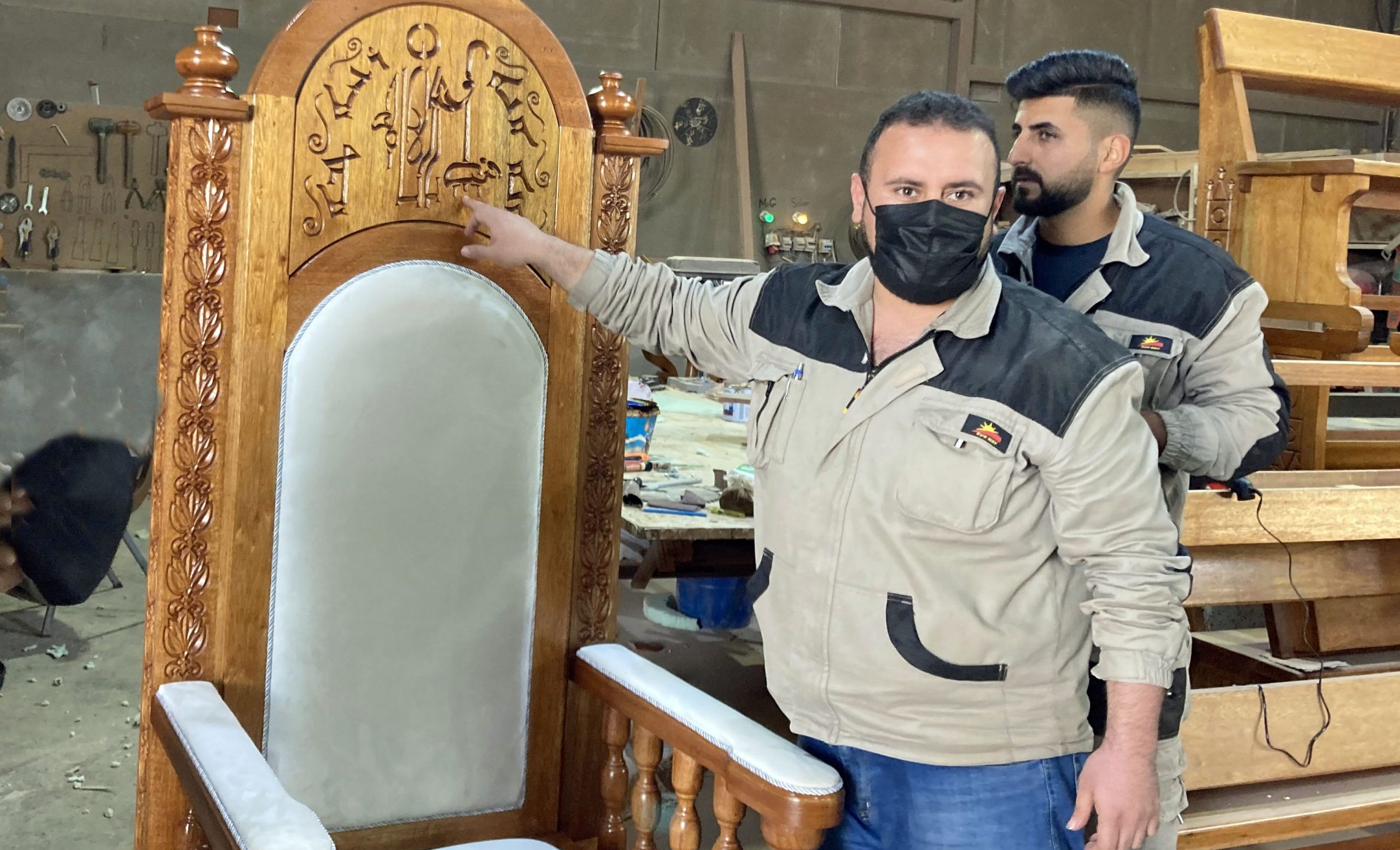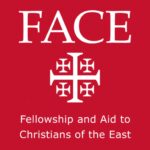Reflection on the Feast of St Matthias

Saint Matthias the Apostle
Feast in the Eastern Church: 9th August
Feast in the Catholic Church: 14th May
Reading
Acts 1:15-17, 20-26
Peter stood up in the midst of the brothers and sisters (there was a group of about one hundred and twenty persons
in the one place).
He said, “My brothers and sisters,
the Scripture had to be fulfilled
which the Holy Spirit spoke beforehand
through the mouth of David, concerning Judas,
who was the guide for those who arrested Jesus.
Judas was numbered among us
and was allotted a share in this ministry.
For it is written in the Book of Psalms:
Let his encampment become desolate,
and may no one dwell in it.
and:
May another take his office.
Therefore, it is necessary that one of the men
who accompanied us the whole time
the Lord Jesus came and went among us,
beginning from the baptism of John
until the day on which he was taken up from us,
become with us a witness to his resurrection.”
So they proposed two, Joseph called Barsabbas,
who was also known as Justus, and Matthias.
Then they prayed,
“You, Lord, who know the hearts of all,
show which one of these two you have chosen
to take the place in this apostolic ministry
from which Judas turned away to go to his own place.”
Then they gave lots to them, and the lot fell upon Matthias,
and he was counted with the Eleven Apostles.
Reflection
by Father Robert Gibbons
We can be forgiven for wondering what it was that Matthias did? There is little known about him except for the account in Acts of him being chosen to replace Judas by prayer and the casting of lots, he is known to have been amongst the original seventy two disciples present with Jesus through his ministry. There are of course later accounts of his life and even an apocryphal gospel attributed to him, but like some of the other Apostles, his personality and activities remain hidden from us.
Is this a bad thing? Not really, for most of us pass through this life like the sparrow St Bede mentions in his Ecclesiastical History: “The sparrow, flying in at one door and immediately out at another, whilst he is within, is safe from the wintry tempest, but after a short space of fair weather, he immediately vanishes out of your sight, passing from winter to winter again. So this life of man appears for a little while, but of what is to follow or what went before we know nothing at all.” That comparison of our lives as a swift flight is something hard for us to contemplate; we live in a media age and one in which the cult of celebrity is strong; our own doings and goings can be noted on Facebook or Twitter or Instagram, and those of the celebrity pored over with minute detail in the gossip columns or specialist magazines. So to think of us as finite, here now, and then gone, is something almost too difficult to comprehend. Yet in the example of the Apostle Matthias we can discern another viewpoint, a different way of looking at ourselves.
Part of our Christian tradition in East and West has a spirituality built upon the ‘kenosis’ of Jesus, that of the emptying out of our self-importance to become like him, humbler, even to taking on the lowest place. Christ’s example is not about self-importance or grandeur, but about love and service. The great commandment, which he says is the fulfilment of the law, is easily understood “‘Love the Lord your God with all your heart and with all your soul and with all your mind.’ This is the first and greatest commandment. And the second is like it: ‘Love your neighbour as yourself.’ All the Law and the Prophets hang on these two commandments.”(Mt 22:37-40) If anything runs deep in all our Christian traditions of East and West it is that call to humble service, which involves knowledge of yourself but also of how that understanding is both dependent on God, in a primary relationship with the Most Holy One, and of recognising in each of our sisters and brothers the ‘icon’ of Christ.
Matthias’ name in Hebrew means ‘gift of the Lord’, that in itself says much to us, he was the one chosen by prayer and a random system of lots to add to the original 12 apostles. This goes against our experience of contemporary selection by discussion of character, of reading long CV’s, facing interviews for selection by an appointed group. Matthias has been alongside the Apostles from the start, so he is a known name, but the way he is chosen is determinedly that of God’s providence. Proverbs 16:33 nicely summarizes this, “The lot is cast into the lap, but the decision is wholly from the Lord.” So whatever Matthias did is largely withheld from us except in that living tradition of prayer and commemoration down the ages; it is God who has decided his mission, but that is as it should be, for he was called not for gain but to serve, his hiddenness from us marks out that loving touch of God in all of us, and helps us celebrate him as one whose whole life from that moment of choice is devoted to the Lord’s will. In this he is at one with the vast numbers of us whose lives are not writ large, but are essential parts of Christ’s mystical body.
Prayers
Hymn of the Eastern Church from the Greek Menaea
O venerable Mathias! thou, like a spiritual firmament, didst proclaim the glory of the only-begotten Son of God. Let us with one glad voice celebrate the praise of this apostle, who was effulgent with the Holy Ghost; he was the fisher of them that had gone astray, the light that reflected the divine brightness, the teacher of the mysteries.
O blessed apostle! the Saviour called thee his friend, because thou didst keep his commandments. Thou art heir to his kingdom, and thou art to sit with him, on a throne, at the last terrible day, O most wise Mathias, who didst complete the number of the apostolic college.
Guided by the sail of the cross, thou, O blessed one, didst pass over the troubled sea of life, and didst reach the haven of rest. Do thou now vouchsafe to join the glad choir of the apostles, and beseech the infinite Judge, that he would show himself a merciful Lord unto us
Collect from the Roman Missal
O God, who assigned Saint Matthias a place in the college of Apostles, grant us, through his intercession, that, rejoicing at how your love has been allotted to us, we may merit to be numbered among the elect. Through our Lord Jesus Christ, your Son, who lives and reigns with you in the unity of the Holy Spirit, God, for ever and ever.
St Matthias the Apostle
Whilst little is known of Matthias’ life, there are strands of tradition that give us some hints as to his ministry after his calling to replace Judas as one of the twelve. We can start with what we discover in Acts. Peter’s criteria for choosing this new apostle is clear, he had to have been with them all from the beginning, “all the time that the Lord Jesus went in and out among us”, so that he could be a true witness to everything Jesus had said and done. Two people fit the bill: Matthias and Joseph. The apostles prayed and then cast lots, Matthias was chosen.
We know that a lost Gospel of Matthias in the New Testament Apocrypha has been attributed to him according to Early Church Fathers but perhaps more reliable is the early writing of St. Clement of Alexandria, who claimed Matthias insisted on the importance of mortification.
The Byzantine historian Nicephorus Callistus Xanthopoulos,, and the fifth century Synopsis of Dorotheus, wrote that Matthias was said to have preached the Gospel in Judea and the region of Colchis (Ethiopia), other traditions tell of him preaching in Cappadocia and round the coastline of the Caspian Sea ( modern day Georgia). Nicephorus wrote of his being martyred, Dorotheus claimed he died at Sebastopolis and was buried near the Temple of the Sun in that place. Others claim he met his death by crucifixion in Colchis or by stoning and beheading in Jerusalem. Hippolytus of Rome, however, contends that he died of old age. Whatever the true account we honour him as one of the twelve who went out at the command of Christ to preach and teach the Good News of salvation after Pentecost.
His Relics
St. Helena, Constantine’s mother, is said to have brought St. Matthias’ relics from Jerusalem and divided them between the Basilica of St. Mary Major in Rome and what is now the Benedictine abbey church at Trier. Historical records dating back to the 5th century indicate the existence of a monastery here, built around or on the graves of the first Christian evangelists sent to Trier. However there is some controversy as to the exact date of the translation of the relics of St Matthias, what is known is that after the disastrous fire of 822 when the Normans destroyed the abbey and the city, rebuilding took place and the relics were discovered in the old building and then enshrined in the Romanesque crypt of the new abbey where they still remain and are venerated by many pilgrims each year.
St Matthias the Apostle – patron saint of carpenters
Photo: The catheda made for Pope Francis by the Karamlesh Joinery in Iraq. Supported by Oeuvre d’Orient and FACE. the joinery workshop manufactures furniture for the homes of the returning Christian families, as well as furniture for the schools, hospitals and churches in the Ninevah plain.

